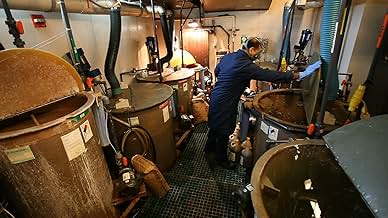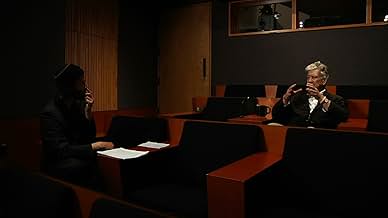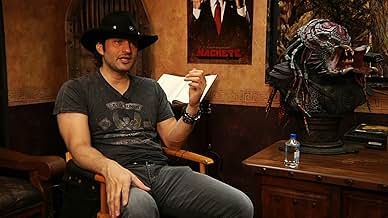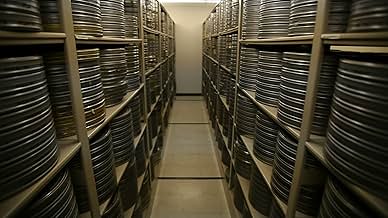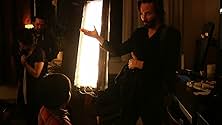AVALIAÇÃO DA IMDb
7,6/10
14 mil
SUA AVALIAÇÃO
Adicionar um enredo no seu idiomaThe documentary investigates the history, process and workflow of both digital and photochemical film creation.The documentary investigates the history, process and workflow of both digital and photochemical film creation.The documentary investigates the history, process and workflow of both digital and photochemical film creation.
- Direção
- Roteirista
- Artistas
- Prêmios
- 1 indicação no total
Avaliações em destaque
Hollywood insiders are aware of a battle that has been brewing for quite sometime now: the technology to capture the image has two camps- film and digital and each are perhaps overwhelming the other. Film is photomchemical and the method by which cinema has been created and projected for all these years (since the late 1890). Digital cameras are new on the block and because they can do everything a film camera can but with less production costs, they are vying to be the medium every director chooses. Keanu Reeves questions industry insiders from top directors and cinematographers and gets a honest non biased overview. This is a good watch for anyone interested in the technical and "behind the camera" scenes of making of film and television. The documentary is precise and educative.
"People love great stories. They love to get into a world and have an experience. And how they get it—it doesn't really matter." David Lynch
Which do you prefer: photochemical or digital projection for your movies? If you're geeky enough, you really care; if not, like me, you want a great story and characters with a crisp image that complements the theme, regardless of whether or not it's film. As for 3D, I can live without it.
Christopher Kenneally's interesting Side by Side documentary presents filmmakers like George Lucas who claim celluloid is dead and those like Christophe Nolan who vow not yet to trade his "oil paints for crayons." The film does a credible job presenting both sides with a slight edge to a future of all digital and a pessimistic take on film as an eventual curiosity.
Among the talking heads are avatars of photography and direction with an occasional producer and actress to get closer to us viewers, who are never questioned even though we are the ultimate arbiters. But the experts have valid and provocative points: the film advocates tout its warmth and color possibilities while the digital dudes trumpet the ease, low cost, and creative infinity. The film does an entertaining job of presenting the sides.
Both sides agree archiving remains a pressing and often neglected issue. Although Martin Scorsese is at the forefront of saving film, no one else has yet taken the case of digital preservation with his passion. The documentary doesn't take enough time on this issue especially since I thought something like my external hard drive would already be in the mix. Not. Apparently even digital imaging can break down in storage.
Oh, well, I'm with Lynch: Give me a super story and beautiful image and let the geeks and gods work out the details.
Which do you prefer: photochemical or digital projection for your movies? If you're geeky enough, you really care; if not, like me, you want a great story and characters with a crisp image that complements the theme, regardless of whether or not it's film. As for 3D, I can live without it.
Christopher Kenneally's interesting Side by Side documentary presents filmmakers like George Lucas who claim celluloid is dead and those like Christophe Nolan who vow not yet to trade his "oil paints for crayons." The film does a credible job presenting both sides with a slight edge to a future of all digital and a pessimistic take on film as an eventual curiosity.
Among the talking heads are avatars of photography and direction with an occasional producer and actress to get closer to us viewers, who are never questioned even though we are the ultimate arbiters. But the experts have valid and provocative points: the film advocates tout its warmth and color possibilities while the digital dudes trumpet the ease, low cost, and creative infinity. The film does an entertaining job of presenting the sides.
Both sides agree archiving remains a pressing and often neglected issue. Although Martin Scorsese is at the forefront of saving film, no one else has yet taken the case of digital preservation with his passion. The documentary doesn't take enough time on this issue especially since I thought something like my external hard drive would already be in the mix. Not. Apparently even digital imaging can break down in storage.
Oh, well, I'm with Lynch: Give me a super story and beautiful image and let the geeks and gods work out the details.
10taifunu
this film is. It's about marking a turning point in the history of cinema and raising awareness about it. Yes, it's a subject that's been discussed and bitched about for what, 10 years now, ever since Lucas proclaimed that film is dead. But maybe for the first time it brings all the opposite opinions together. Side by side. (Loved the editing - it was just like watching a tennis match) And for people like myself, 'civilian' moviegoers who while watching a movie often found themselves forgetting about the popcorn and instead wondering 'how it's made?', this film is like Christmas in June :) I mean, I've read a bit about film making; I've come across some of the terms and looked up their definition; I knew what a DP does; I've scratched a bit the surface of the whole wide world of movie making. But to have the main processes explained clearly, precisely and in a language I could understand, all this in a one-and-a-half hour film, was like... like attending film school but without the (almost always compulsory) elitism and snobbery ;) :D
And watching the documentary at a film festival was a special experience per se. It was shown in a small old-fashioned theater, with creaking seats and wood floors and velvet curtains and no air conditioning; and old theater where once I used to go watch old cinematheque movies in black-and-white. There was a bitter-sweet irony about it. The audience was formed mainly by film festival guests and film students; people with technical background in movie making, and a few lost souls like myself, who just wanted to watch the documentary we read so much about. And it was a joy to see them react to the technical jokes; to hear a few of them hoot when on the screen someone was talking about the operator and the DP losing their god-like status on the set, or to hear them snicker when Cameron rhetorically asks Reeves 'you've been on a few sets in your life, haven't you?'
It's a film about nostalgia and inevitability, with a very light note of sadness.
But this was just the first date, and I'm quite taken with the film, so I'd really like to get to know it better. You know, take it on a second date, then a third. I'll take it to the movies, the old-fashioned way ;) I'll wine it, dine it, maybe even take it on the obligatory weekend to Paris. It could be the beginning of a long lasting relationship. So, when is the DVD gonna be released ? ;) :)
And watching the documentary at a film festival was a special experience per se. It was shown in a small old-fashioned theater, with creaking seats and wood floors and velvet curtains and no air conditioning; and old theater where once I used to go watch old cinematheque movies in black-and-white. There was a bitter-sweet irony about it. The audience was formed mainly by film festival guests and film students; people with technical background in movie making, and a few lost souls like myself, who just wanted to watch the documentary we read so much about. And it was a joy to see them react to the technical jokes; to hear a few of them hoot when on the screen someone was talking about the operator and the DP losing their god-like status on the set, or to hear them snicker when Cameron rhetorically asks Reeves 'you've been on a few sets in your life, haven't you?'
It's a film about nostalgia and inevitability, with a very light note of sadness.
But this was just the first date, and I'm quite taken with the film, so I'd really like to get to know it better. You know, take it on a second date, then a third. I'll take it to the movies, the old-fashioned way ;) I'll wine it, dine it, maybe even take it on the obligatory weekend to Paris. It could be the beginning of a long lasting relationship. So, when is the DVD gonna be released ? ;) :)
As a film student or just a movie lovers, you rarely got a chance to connect with cinema history, or meet with famous people in the industry who set the standard and created the masterpieces. This documentary gives it all in a friendly story telling mode that could benefit both professionals or just any random viewers
As much as it is about digital, it's equally about how cinema develop and what it would be like in the future. The documentary points out an interesting finding that it's the professionals, not the technology that drives the storytelling art forward. Each and every of them offer their best performance and artistry via the choice of techniques they made.
It's fantastic to see how filmmakers form different groups of opinions and stay faithful to it. While the film did not intend to come to any conclusion about future of cinema in digital or old style film, it clearly set up a basic understanding about filmmaking as a painstakingly process that require endless decision making based on personal visual creative interpretation.
A nice to watch movie for film students, especially those are fans of David Lynch, James Cameroon or George Lucas, the main speakers
As much as it is about digital, it's equally about how cinema develop and what it would be like in the future. The documentary points out an interesting finding that it's the professionals, not the technology that drives the storytelling art forward. Each and every of them offer their best performance and artistry via the choice of techniques they made.
It's fantastic to see how filmmakers form different groups of opinions and stay faithful to it. While the film did not intend to come to any conclusion about future of cinema in digital or old style film, it clearly set up a basic understanding about filmmaking as a painstakingly process that require endless decision making based on personal visual creative interpretation.
A nice to watch movie for film students, especially those are fans of David Lynch, James Cameroon or George Lucas, the main speakers
This is a documentary that every film enthusiast must watch. It will give you an understanding of the ways a feature film is shot and projected. To the unaware today most movies are shot on digital cameras as opposed to the photochemically styled film cameras of the past days. Both have their plus and minuses and in this documentary, Keanu Reeves goes about explaining the differences of the format and the opinion of most famous filmmakers on the subject. Featuring everyone from James Cameron to Martin Scorsese Side by Side is a great look at the technical aspect of cinema.
Você sabia?
- Erros de gravaçãoIdentifies Distrito 9 (2009) as being shot on the Sony F23. It was actually shot on Red One cameras.
- Citações
Martin Scorsese: The only way you can make sure that a film or anything on the moving image is going to be around sixty or seventy years from now, interestingly enough, ironically enough, is celluloid.
- ConexõesFeatured in Film '72: Episode dated 13 February 2013 (2013)
Principais escolhas
Faça login para avaliar e ver a lista de recomendações personalizadas
- How long is Side by Side?Fornecido pela Alexa
Detalhes
- Data de lançamento
- País de origem
- Centrais de atendimento oficiais
- Idioma
- Também conhecido como
- Side by Side
- Empresa de produção
- Consulte mais créditos da empresa na IMDbPro
Bilheteria
- Faturamento bruto nos EUA e Canadá
- US$ 58.825
- Fim de semana de estreia nos EUA e Canadá
- US$ 6.956
- 19 de ago. de 2012
- Faturamento bruto mundial
- US$ 67.054
- Tempo de duração
- 1 h 39 min(99 min)
- Cor
- Proporção
- 1.85 : 1
Contribua para esta página
Sugerir uma alteração ou adicionar conteúdo ausente







